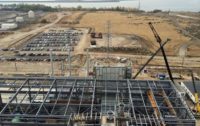The beleaguered Spanish green energy developer Abengoa SA has found a way to keep its creditors at bay and skirt bankruptcy, for now—by selling off a large part of its biofuels business, according to the company.
But Abengoa told Bloomberg that it wants to keep its engineering-construction business Abeinsa S.A. and continue developing projects—refusing to confirm rumors of acquisition talks with French contracting giant Vinci.
Abeinsa ranks at No. 54 on ENR's list of the Top 250 Global Contractors, with more than $6 billion in global revenue, including $5.8 billion outside of Spain. It is the second-largest contractor in the global power market, according to ENR data, and ranks first among worldwide builders in transmission and distribution, cogeneration and solar power.
Under a plan released in late January, Abengoa will sell off what is terms non-fundamental assets that include so-called first-generation biofuel plants that produce fuel directly from plant stock. The plan does not affect the company’s second-generation, or advanced, biofuel projects that produce fuel from plant waste. These reportedly includes the firm's cellulosic ethanol plant in Hugoton, Kan., even though its staff was laid off in November, says Biomass Magazine.
According to Biomass, Abengoa currently owns six first-generation ethanol plants in the U.S., along with the Hugoton facility. The company also owns five ethanol plants, one biodiesel plant, and one cellulosic demonstration plant in Europe, along with three ethanol plants in Brazil.
But the U.S. is the largest holder of Abengoa’s $23 billion in debt, and accounted for 28% of its sales in 2013—more than any of the 20 countries in which Abengoa has projects, according to media reports in Texas. The company closed offices in Austin and Chesterfield, Mo., and was removed from a natural-gas power-plant project in Oregon in December.
Brazil's Mines and Energy Ministry told Reuters in late January that it is talking with executives from local and international energy firms, including Spain-based Cymimasa and Elecnor, China State Grid and Brazil's Engevix and Alupar, to take over Abengoa's abandoned transmission and wind projects in the country, and is seeking new project financing from investors.
Abengoa has been working on business recovery since filing for bankruptcy in November after failing to secure an investment. While the company says it will work with its creditors to restructure, analysts remain concerned it will not meet a March deadline to avoid bankruptcy, Bloomberg reports.
But the negotiations with Abengoa’s creditors are ongoing, a source familiar with the deal who prefers to remain anonymous, tells ENR.
The company wants to shrink its corporate debt from $9.8 billion to about $3.27 billion, a person familiar with the deal tells Reuters.




Post a comment to this article
Report Abusive Comment